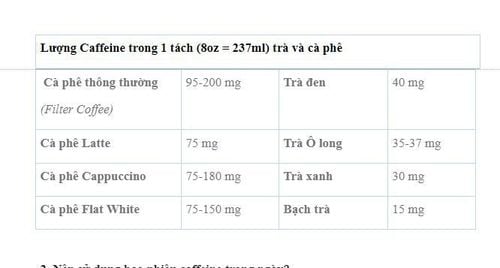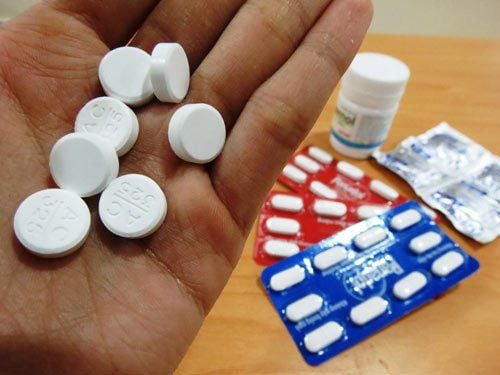This is an automatically translated article.
Posted by Pharmacist Dinh Thi My Hanh - Faculty of Pharmacy - Vinmec Central Park International General Hospital.
Caffeine overdose occurs when you absorb too much of this energy source through drinks, foods or drugs. However, some people are able to use more than the recommended daily amount per day with no problem. This is not recommended as high doses of caffeine can cause some serious health problems such as irregular heartbeat and seizures.
1. What is caffeine?
Caffeine is a natural stimulant found in many plants (including coffee, cocoa beans, and tea leaves), foods, beverages, and other products.
So what does caffeine do? It can increase blood pressure and heart rate, boost energy, so is often used to help us stay awake and alert. Caffeine is also used in the manufacture of pharmaceuticals as an ingredient in drugs.
Some popular beverages, such as coffee, tea and soda, contain significant amounts of caffeine. In addition, some other foods and medicines also contain caffeine such as chocolate, cocoa, energy drinks, soft drinks, some over-the-counter medicines that contain caffeine (eg Panadol Extra, Panadol flu, etc.)

Lượng caffeine trong 1 tách (8oz = 237ml) trà và cà phê
2. How much caffeine should be used during the day?
According to the Mayo Clinic, the recommended amount of caffeine is 400 milligrams per day for healthy adults. Teens should not exceed 100 mg of caffeine per day.
Caffeine overdose occurs when you absorb too much of this energy source through drinks, foods or drugs. However, some people are able to use more than the recommended daily amount per day with no problem. This is not recommended as high doses of caffeine can cause some serious health problems such as arrhythmias and seizures. Regular high caffeine intake can also lead to hormonal imbalances.
The mean half-life of caffeine in the blood is 1.5 - 9.5 hours; which means it can take 1.5 - 9.5 hours for caffeine blood levels to drop to half of what was initially consumed. This prolonged mean half-life makes it difficult to know exactly how much caffeine could lead to an overdose. So the safe level of caffeine for each person is different based on age, weight and overall health.
Due to caffeine's lingering effects, the American Academy of Sleep Medicine recommends that caffeine should not be consumed at least 6 hours before bedtime. So if you go to bed at 10 p.m., you shouldn't drink caffeine no later than 4 p.m.
3. Caffeine overdose
If you rarely use caffeine, your body may be especially sensitive to caffeine. So avoid eating or drinking too much caffeine at once.
Some types of symptoms occur with caffeine overdose such as:
Diarrhea, thirst. Headache, dizziness, insomnia, irritability. Fever. Other symptoms are more serious and require immediate medical treatment such as:
Shortness of breath, chest tightness. Vomiting, hallucinations. Irregular or fast heartbeat. Uncontrolled muscle movements, convulsions. The effects of caffeine reach its peak within 30 - 60 minutes after you consume it. This is when users are most likely to experience the “jittery” effects of caffeine. People who are sensitive to caffeine may feel symptoms for several hours or even days after consuming it.
If a caffeine overdose is suspected, tell your doctor about any caffeine-containing foods or drinks you have used prior to your symptoms.
The problem of caffeine overdose is usually treatable without causing long-term health problems. But the condition can be fatal, especially for younger patients, such as infants and toddlers.
To prevent caffeine overdose, avoid consuming too many of these foods in the same day. In most cases, you shouldn't have more than 400 mg of caffeine per day, or even less if you're particularly sensitive to caffeine.

Quá liều caffeine có thể gây khó thở.
4. Use of caffeine for pregnant or lactating women
For years, experts have advised women to use caution when using caffeine during pregnancy, as the effects of caffeine on the baby are not fully known.
Caffeine can be transferred through breast milk to the baby. According to the Australian Breastfeeding Association, your baby could consume about 1% of your caffeine intake if you breastfeed. The highest amount of caffeine will be reached about 1 hour after drinking caffeine Therefore, the best time for breastfeeding women to consume caffeine without affecting the baby is 4 hours after drinking.
Newborns can also experience caffeine overdose when breast milk contains too much of it. Some of the mild symptoms that children experience are nausea and the muscles constantly tense and then relax. More serious symptoms may include vomiting, rapid breathing, and shock. If you or your child experiences these symptoms, seek medical help immediately for diagnosis and treatment.
5. Caffeine detox
If you are used to drinking caffeine, when you stop the habit suddenly you may experience caffeine withdrawal symptoms. Caffeine withdrawal symptoms tend to go away within 48 hours, but stopping suddenly can make withdrawal symptoms stronger.
According to the American Heart Association, you may experience withdrawal symptoms within 12 to 24 hours of stopping eating or drinking caffeinated beverages. These symptoms may include:
Headache (most common symptom), dizziness. Depression, anxiety. Drowsiness and fatigue. Caffeine is just one way to boost alertness and fight sleepiness. Because of these possible side effects, you may consider reducing your daily caffeine consumption to 300 mg a day. This equates to about 3 cups of regular, small-roasted coffee.
It is important to find other ways you can stay awake naturally without caffeine, for example:
Drink more water. Sleep at least 7 hours every night. Eating lots of plant-based foods can help provide energy without being affected by processed foods. Exercise daily, but not too close to bedtime. See your doctor if you often feel tired. Some underlying medical conditions, such as depression and sleep disturbances, can also affect your alertness.
Please dial HOTLINE for more information or register for an appointment HERE. Download MyVinmec app to make appointments faster and to manage your bookings easily.
References: healthline.com, mayoclinic.org, marchofdimes.org, americanpregnancy.org












